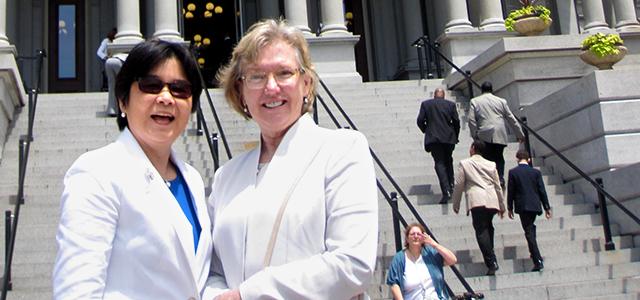
OiSaeng Hong (left) and Patricia Dennehy
Nurses Take Center Stage at White House Talk on Affordable Care Act
Since the US Supreme Court ruled most of the Affordable Care Act (ACA) constitutional, multiple news stories have fretted that there won’t be enough physicians to provide health care to 32 million newly insured people. Primary care is a particular concern.
Most of the stories ignore the fact that nurses make up the largest sector of health care providers in the United States – and that advanced practice nurses have the skills and training necessary to meet many of the primary care needs central to key elements of the ACA.
That’s part of the message 80 nurse leaders from around the country – including two from UCSF School of Nursing – carried into a special meeting on June 13 with senior White House and Health and Human Services (HHS) officials. During this conversation, the nurse leaders shared ideas for improving heath care quality as HHS continues its ACA implementation over the next year and a half.
Support for Nurse Practitioners
Patricia Dennehy, a clinical professor and director of GLIDE Health Services, and OiSaeng Hong, a professor in the Department of Community Health Systems and director of the Occupational and Environmental Health Nursing Program, represented UCSF at the meeting.
Dennehy spoke to the assembled group on several of the major themes of the two-hour discussion, including the use of advanced practice nurses to provide primary care in community health settings. Her remarks acknowledged the contribution of the Health Resources and Services Administration (HRSA), which has funded nursing education in settings like GLIDE.
GLIDE is the largest nurse-managed health center on the West Coast, receiving about 16,000 visits annually from 3,000 patients. Fifty-five percent of patients are homeless and 85 percent live below the federal poverty line. Given the special challenges these patients face in gaining access to care, nurses there must come up with creative solutions – solutions that Dennehy said can often be adapted for more efficient care delivery in more traditional settings.
She made two requests to HRSA, HHS and President Obama’s staff. First, she asked that funding legislated for nurse-managed health centers be renewed and expanded. Glide currently receives a three-year, $1.5 million grant that will run out in the next year.
Second, she asked the government to exert influence through the new alliance of private insurance and public benefit exchanges to include nurse practitioners (NPs) in the list of primary care providers offered for patient selection. California will have 7 million new participants in the health exchange, and Dennehy explained that NPs could offset reported shortages of MDs by providing primary care services. She and other nurse leaders are working with California legislators on amending the language so that those provider lists include NPs.
Hong was invited as the immediate past president of the Asian American/Pacific Islander Nurses Association. She was gratified to hear several recommendations for improving health care, outcomes and cost savings for Asian Americans and Pacific Islanders, including investing in prevention services, increasing the availability of culturally and linguistically appropriate services, and investing in a culturally and linguistically appropriate workforce.
“It was a great honor and privilege to be at the meeting to represent the Asian American, Native Hawaiian and Pacific Islander community and to be involved in the discussion on how nurses work to improve the delivery of American health care,” says Hong.
A Serious Effort to Incorporate Nursing’s Perspective
Dennehy was encouraged that the meeting demonstrated a serious effort on the part of the Obama administration to seek input from nurses on how to make health care reform work.
“I did get the feeling that nurses were being given a voice in this discussion. It was very empowering,” she says. “We’re looking at a monumental amount of change. We’ve spent a great deal of money for a very unsatisfying system of health care, and nursing definitely has a role in reforming this system. It’s going to take a full team of nurses and other health professionals working together to turn this system around.”
Editor’s Note: For more on the potential for advanced practice nurses to fill the primary care gap, see this previous Science of Caring cover story.



